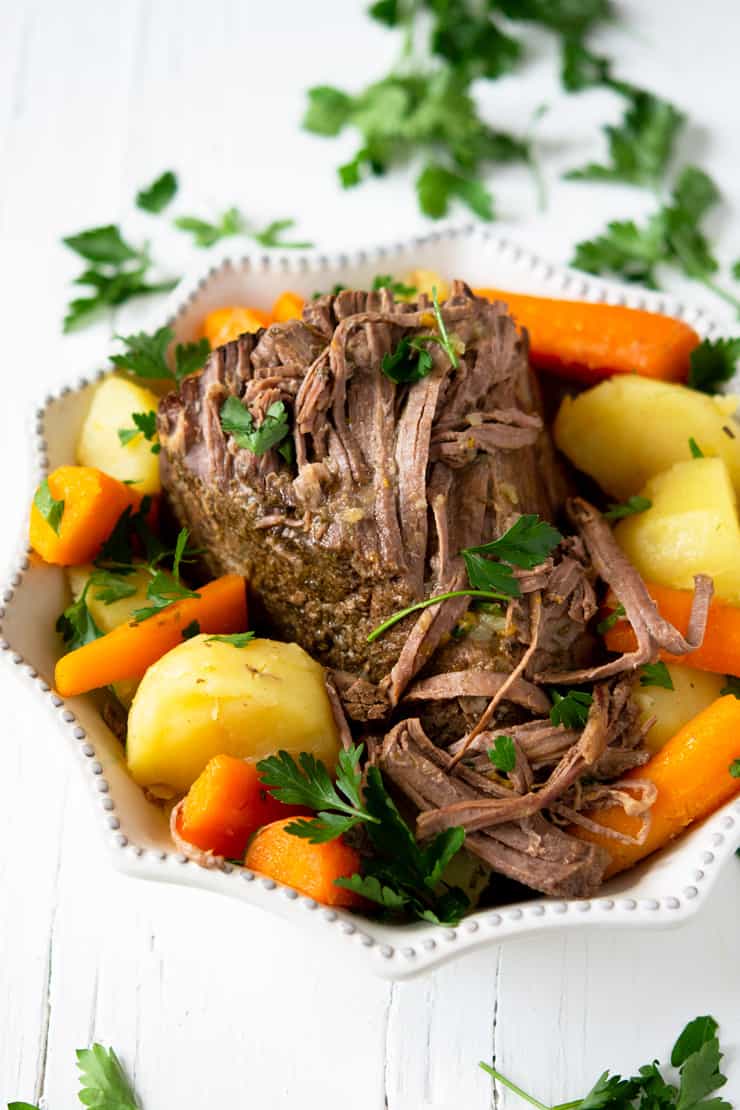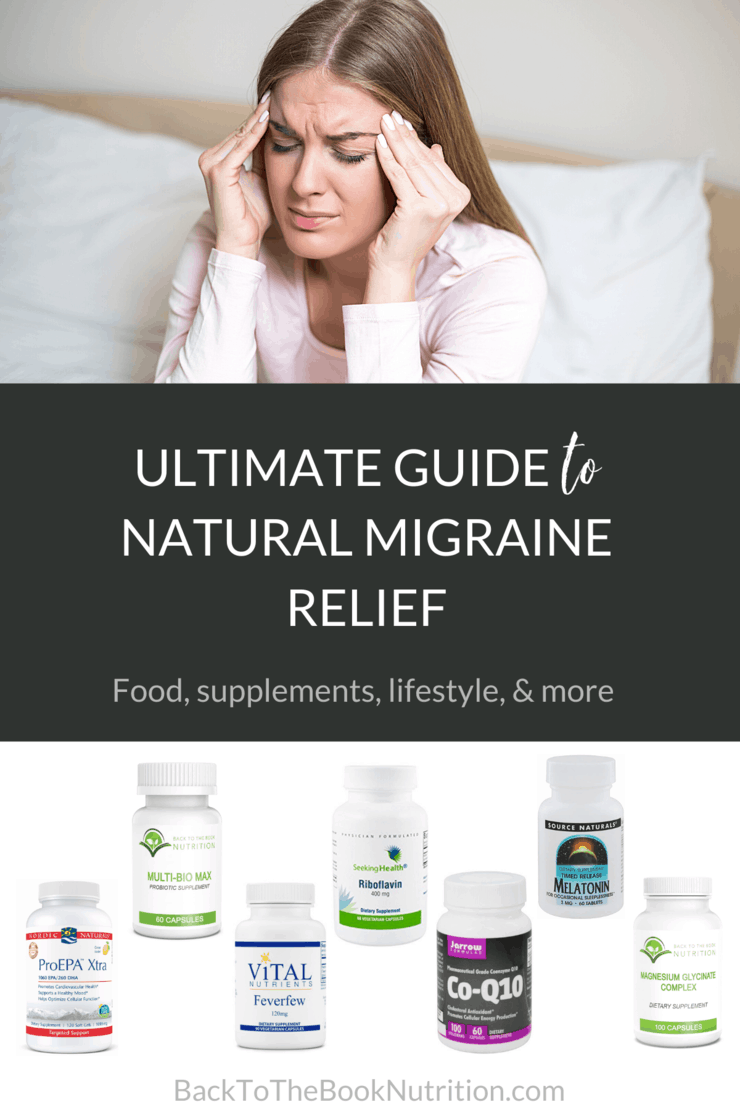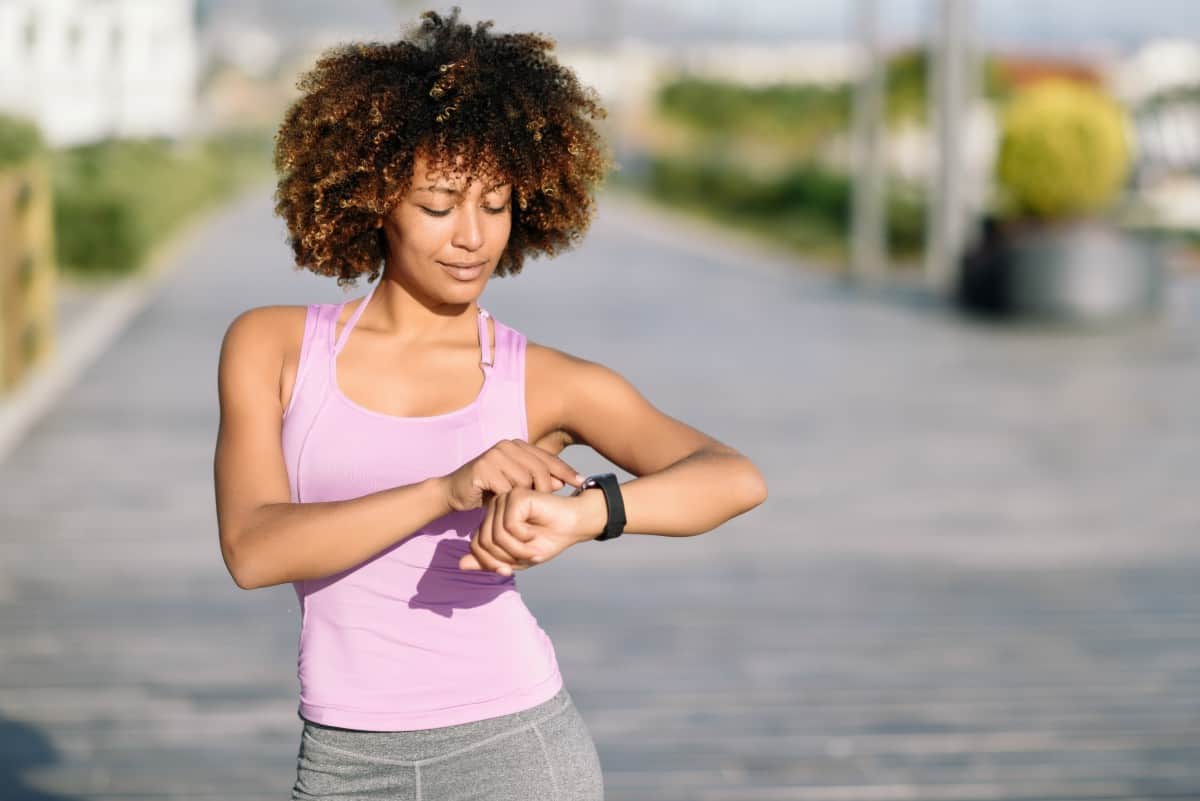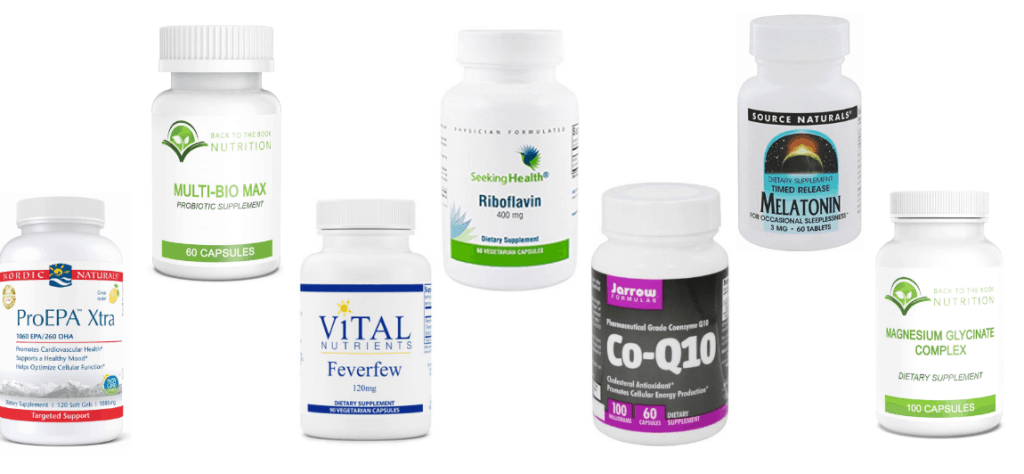Over 15 affordable, effective natural remedies for migraines, plus links to all the scientific research to back them up!
Note from Dena: This post was co-written with Dietetic Interns, Kendall Farr and Khadija Hamid, as part of a research partnership between Back To The Book Nutrition and post-graduate nutrition students from the University of Houston.
If you’re looking for natural migraine relief, this ultimate guide as you covered! It includes over 15 different natural remedies for migraines, plus links to all the research to back them up!
But first, what separates a migraine from a run of the mill headache?
Headache vs. Migraine
Headaches vary in frequency and intensity, but are typically less severe than migraines. Migraine is a neurological condition that is characterized by recurring debilitating headaches, often with intense throbbing pain that is so severe it interferes with the daily activities.
Migraines affect 39 million people in the U.S., mostly women.
Common Migraine Symptoms (1)
- Severe headache lasting 4-72 hours
- Sometimes isolated to one area or side of the head
- Blurred vision or other vision disturbances
- Nausea or vomiting
- Sensitivity to light and/or sound
- Fatigue
- Dizziness
- Scalp tenderness
In addition to these distinct symptoms, migraines can be classified into various types.
An evaluation by a neurologist or a doctor who specializes in migraine can help confirm which type you have.
- Migraine with Aura
Recurring headache that strikes after or at the same time as sensory disturbances called an aura. These disturbances can include flashing lights, blind spots, zig-zag lines or temporary blindness. - Migraine without Aura
Headache is usually on one side of the head with throbbing or pulsating pain which affects the normal daily activities and will worsen by physical activity such as walking or climbing stairs. - Retinal Migraine
It is an eye condition that causes brief attacks of blindness or visual problems in one eye, along with dull ache behind the eyes that may spread to the rest of the head. - Migraine with brainstem aura
It is associated with the headaches that start in the lower part of the brain, called the brainstem. They cause symptoms such as dizziness, double vision, and lack of coordination. - Hemiplegic migraine
A person with hemiplegic migraine will experience a temporary weakness, numbness and tingling, and paralysis on one side of the body. - Chronic migraine
Headache occurs on 15 or more days per month for more than three months, which, on at least 8 days per month, has the features of migraine headache. - Menstrual migraine
It usually occurs in the two days leading up to a period and first three days of the flow. It is more common in women with other PMS symptoms.
Migraines are usually a symptom of a deeper root cause in the body. Understanding the root cause of your migraines can help you decide which of the following remedies will be most helpful.
The Ultimate Guide to Natural Migraine Relief
1. Stay Hydrated (+ consider electrolytes)
- Dehydration triggers headaches that feels like a tightening or pressure sensation all over the head. Dizziness can also occur.
- Try carrying a large water bottle with you throughout the day as a reminder to drink.
- Many people also need electrolyte replacement supplements in addition to just water (Seeking Health Optimal Electrolytes powder and Nuun tablets are two good options).
2. Balance Your Blood Sugar
- Sharp rises and falls in blood sugar can trigger a migraine attack. (12)
- If you find that fasting, waiting too long between meals, or eating too few or to many carbohydrates triggers your migraines, eat balanced meals (carbs, fat, and protein) at regular intervals throughout the day.
- Work with your provider to address cortisol imbalances, inflammation, insulin resistance, or diabetes, which all directly affect blood sugar.
3. Eliminate Food Sensitivities + Personal Triggers
- Common foods and food additives that have been linked to migraines:
- Processed meats, especially those containing nitrites
- Chocolate
- Alcohol, especially red wine
- Aged cheeses
- Gluten
- Foods high in MSG
- Artificial sweeteners, such as aspartame, sucralose, neotame, and saccharin
- Cold foods and beverages
- Caffeine – Caffeine is a double edged sword. Caffeine withdrawal may trigger migraines, but caffeine consumption during a migraine can help bring relief. (7)
- Non food items can trigger migraines too – be mindful of perfumes, fragrances, and other chemical exposures.
- Try eliminating any items you suspect may trigger your migraines, then slowly reintroduce them, one at a time, keeping a diary to help you confirm which seem to trigger your symptoms.
- Testing for food, chemical, and environmental sensitivities may also be helpful.
4. Decrease Your Screen Time
- Blue light from computer screens, phones, and fluorescent light bulbs has been shown to cause more discomfort in migraine sufferers (11).
- Remember to take frequent breaks from working on these devices throughout the day.
- Turn off all screens at least 1 hour before bed.
- Wear blue light blocking glasses when using screens.
5. Get on a Sleep Schedule
- Sleeping less than 7 hours per night and irregular sleep schedules make you more prone to migraine. (10)
- Go to bed at a similar time each night and aim for at least 7 hours of sleep per night.
6. Reduce and Manage Stress
- Stress is a trigger for almost 70% of individuals with migraine.
- Related emotions like fear, anxiety, or excitement can increase muscle tension and dilate blood vessels, which makes a migraine more severe (13).
7. Exercise Regularly
- Exercise during a migraine isn’t recommended, but it appears that exercising a few times per week can help prevent migraines, reducing their frequency, duration, and intensity. (20)
8. Fix your gut
- Migraine is associated with several GI disorders such as H. Pylori infection, Irritable Bowel Syndrome (IBS), and Celiac Disease (CD). (16)
- Multiple studies have shown high potency probiotic supplements to significantly improve migraines. (16)
- It is suspected the gut inflammation, dysbiosis (imbalance of “good” and “bad” gut bacteria), and leaky gut may also play a role in migraines.
- Eat a plant-rich, whole foods diet with plenty of fiber, probiotics (fermented veggies, cultured dairy, etc.), and foods that help sooth and seal the gut lining like bone broths, collagen and gelatin, okra, and herbs like slippery elm and marshmallow root.
- If you have GI symptoms, consider getting a comprehensive stool test like the GI MAP to help you find and fix gut issues that could be contributing to your migraines.
Schedule a free call to learn more about the GI MAP stool test!

9. Correct Low Iron
- One study showed rates of iron deficiency among migraine sufferers are about double those of non migraine sufferers. (17)
- Low ferritin (iron storage levels) have also been linked to migraines. (17)
- Have your provider check both your iron and your ferritin (or order the Ferritin, Iron & Total Iron Binding Capacity -TIBC panel yourself here, which includes both)
- If your iron and/or ferritin are low, increase iron rich foods like liver, red meat, and poultry, and cook in cast iron when possible.
- If you need an iron supplement, consider one with chelated iron for best absorption with less likelihood to cause nausea and constipation.
10. Correct Low Serotonin
- Some studies suggest low serotonin levels can contribute to migraines, and some migraine medications even work by altering serotonin levels.
- If you also struggle with depression, anxiety, irritability, insomnia, or constipation, low serotonin may be at play.
- Improving gut health is one of the best ways to improve serotonin levels since most of our serotonin is made in the gut (See #7 above for tips).
- One study showed that 400 mg/day of 5-HTP improved migraine symptoms in 52% of participants. (18) Discuss with your provider whether a trial of 5-HTP supplements (a precursor to serotonin) could also be beneficial. If you take SSRI’s or other medications that alter serotonin levels, do not take 5-HTP unless approved by your prescribing physician as this combination can be dangerous.
11. Balance Your Hormones
- If your migraines consistently occur at a specific time in your menstrual cycle (the week before or the first few days of bleeding is common), hormonal shifts may be to blame.
- Pregnancy and birth control pills can also cause hormone related migraines.
- Follow these basic steps to balance your hormones.
- Consider working with a provider to find and fix your specific hormone imbalance (high estrogen? low progesterone?). Comprehensive hormone testing like DUTCH Testing may be helpful.
12. Lower Your Blood Pressure
- High blood pressure and other risk factors for heart disease have been associated with migraines. (21)
- Losing weight, reducing blood sugar, and lowering inflammation are all helpful ways to lower blood pressure.
- New studies show there may be a link between genetic tendency toward high blood pressure and migraines. (22) If you and multiple family members have high blood pressure and/or other heart disease risk factors, genetics may be a a factor in your migraines.
13. Try Migraine Supplements
Always discuss your individual needs with a health care provider before trying new supplements.
-
- Riboflavin (vitamin B2) (3)
- B6 + Folic acid/folate (20)
- Magnesium(2,4)
- Iron (17)
- Coenzyme Q10 (CoQ10) (5)
- Fish Oil (20)
- Probiotics (16)
- Melatonin (19)
- 5-HTP (18)
- Feverfew (6)
- Ginger (25, 26)
- Diamine Oxidase (DAO) (23)
- Homeopathic Remedies (Belladonna, Cyclamen, Gelsemium, Ignatia, Sulfur, and others) (24)
- Butterbur – Some studies have shown butterbur to be effective, but it is hard on the liver and carries other risks, so is typically not recommended. (20)
14. Get Acupuncture
- Just 5 acupuncture sessions was shown to significantly decrease intensity of migraine pain in one study (14).
15. Manual Therapies (Chiropractic, Physical Therapy, Osteopathic Manipulation, etc.)
- Numerous studies have shown at least some benefit of these therapies on migraine frequency and severity. (15, 20)
16. Mind Body Practices (Meditation, Breathwork, Yoga, Tai Chi, etc.)
- Many studies have evaluated these practices with mixed results. Positive results included reduce pain perception, reduced need for medication, and decreased migraine frequency (thought to be related to reduced blood pressure). (20)
Bottom Line for Migraine Relief
It is important to remember that no two people are the same and what works for one person may not work for everyone.
Furthermore, you’ll get the best results by not only using supplements and other “quick fixes” for your migraines, but also finding and addressing the deeper root causes.
As always, if you want guidance about which of the above will be most effective for your migraines, working with Dena or another licensed holistic practitioner can help!
Schedule a free call now!
About the Co-Authors
Kendall Farr is originally from Atlanta and attended the University of Georgia (UGA), where she obtained Bachelor’s degrees in both Dietetics and Psychology. She then continued on at UGA to pursue an Accelerated Master’s degree in Foods and Nutrition where her research focused on the creation of novel supplements for endurance athletes.
Khadija Hamid is a Dietetic Intern at the University of Houston. She graduated from Masters in Healthcare Leadership and Management from University of Texas at Dallas. Her goal is to use nutrition and food science to make a positive impact by improving community’s health.
Disclaimer: Information on this site is intended only for informational purposes and is not a substitute for medical advice. Always consult with a trusted healthcare provider before implementing significant dietary change. Read additional disclaimer info here.
References
- Rothrock, J. F. (2008). What Is Migraine? American Migraine Foundation. Retrieved from https://americanmigrainefoundation.org/resource-library/what-is-migraine/
- Chiu, H. Y., Yeh, T. H., Huang, Y. C., & Chen, P. Y. (2016). Effects of Intravenous and Oral Magnesium on Reducing Migraine: A Meta-analysis of Randomized Controlled Trials. Pain physician, 19(1), E97–E112. https://pubmed.ncbi.nlm.nih.gov/26752497/
- Boehnke, C., Reuter, U., Flach, U., Schuh-Hofer, S., Einhaupl, K. M., & Arnold, G. (2004). High-dose riboflavin treatment is efficacious in migraine prophylaxis: an open study in a tertiary care centre. Eur J Neurol, 11(7), 475-477. https://pubmed.ncbi.nlm.nih.gov/15257686/
- Hyman, M. Magnesium: The Most Powerful Relaxation Mineral. Retrieved from http://www.eatonpurpose.com/wp-content/uploads/2014/07/Magnesium-Hyman-Client-Handout.pdf
- Sándor, P. S., Di Clemente, L., Coppola, G., Saenger, U., Fumal, A., Magis, D., . . . Schoenen, J. (2005). Efficacy of coenzyme Q10 in migraine prophylaxis: A randomized controlled trial. Neurology, 64(4), 713. https://pubmed.ncbi.nlm.nih.gov/15728298/
- Pittler, M. H., & Ernst, E. (2004). Feverfew for preventing migraine. Cochrane Database of Systematic Reviews(1). https://www.cochranelibrary.com/cdsr/doi/10.1002/14651858.CD002286.pub2/abstract
- Shapiro, R. E. (2017). Caffeine and Migraine. American Migraine Foundation. Retrieved from https://americanmigrainefoundation.org/resource-library/caffeine-and-migraine/
- American Migraine Foundation (2017). What Type of Headache Do You Have? Retrieved from https://americanmigrainefoundation.org/resource-library/what-type-of-headache-do-you-have/
- WebMD. Types of Migraine Headaches. Retrieved from https://www.webmd.com/migraines-headaches/migraine-headache-types
- Lin, Y. K., Lin, G. Y., Lee, J. T., Lee, M. S., Tsai, C. K., Hsu, Y. W., Lin, Y. Z., Tsai, Y. C., & Yang, F. C. (2016). Associations Between Sleep Quality and Migraine Frequency: A Cross-Sectional Case-Control Study. Medicine, 95(17), e3554. https://doi.org/10.1097/MD.0000000000003554
- Digre, K. B., & Brennan, K. (2012). Shedding Light on Photophobia. Journal of Neuro-Ophthalmology, 32(1), 68–81. https://www.ncbi.nlm.nih.gov/pmc/articles/PMC3485070/
- Haghighi, F. S., Rahmanian, M., Namiranian, N., Arzaghi, S. M., Dehghan, F., Chavoshzade, F., & Sepehri, F. (2016). Migraine and type 2 diabetes; is there any association?. Journal of diabetes and metabolic disorders, 15(1), 37. https://doi.org/10.1186/s40200-016-0241-y
- Maleki, N., Becerra, L., & Borsook, D. (2012). Migraine: maladaptive brain responses to stress. Headache, 52 Suppl 2(Suppl 2), 102–106. https://www.ncbi.nlm.nih.gov/pmc/articles/PMC3475609/
- Gu, T., Lin, L., Jiang, Y., Chen, J., D’Arcy, R. C., Chen, M., & Song, X. (2018). Acupuncture therapy in treating migraine: results of a magnetic resonance spectroscopy imaging study. Journal of pain research, 11, 889–900. https://www.ncbi.nlm.nih.gov/pmc/articles/PMC5931197/
- Rist, P. M., Hernandez, A., Bernstein, C., Kowalski, M., Osypiuk, K., Vining, R., Long, C. R., Goertz, C., Song, R., & Wayne, P. M. (2019). The Impact of Spinal Manipulation on Migraine Pain and Disability: A Systematic Review and Meta-Analysis. Headache, 59(4), 532–542. https://pubmed.ncbi.nlm.nih.gov/30973196/
- Arzani, M., Jahromi, S.R., Ghorbani, Z. et al. Gut-brain Axis and migraine headache: a comprehensive review. J Headache Pain 21, 15 (2020). https://doi.org/10.1186/s10194-020-1078-9
- Tayyebi, A., Poursadeghfard, M., Nazeri, M., & Pousadeghfard, T. (2019). Is There Any Correlation between Migraine Attacks and Iron Deficiency Anemia? A Case-Control Study. International journal of hematology-oncology and stem cell research, 13(3), 164–171. https://www.ncbi.nlm.nih.gov/pmc/articles/PMC6801325/
- Benedittis, G. D., & Massei, R. (1986). 5-HT Precursors in Migraine Prophylaxis: A Double-Blind Cross-Over Study With L-5-Hydroxytryptophan Versus Placebo. The Clinical Journal of Pain, 123-130. https://journals.lww.com/clinicalpain/toc/1986/02020
- Gonçalves, A. L., Martini Ferreira, A., Ribeiro, R. T., Zukerman, E., Cipolla-Neto, J., & Peres, M. F. (2016). Randomised clinical trial comparing melatonin 3 mg, amitriptyline 25 mg and placebo for migraine prevention. Journal of neurology, neurosurgery, and psychiatry, 87(10), 1127–1132. https://doi.org/10.1136/jnnp-2016-313458
- Wells, R. E., Beuthin, J., & Granetzke, L. (2019). Complementary and Integrative Medicine for Episodic Migraine: an Update of Evidence from the Last 3 Years. Current pain and headache reports, 23(2), 10. https://www.ncbi.nlm.nih.gov/pmc/articles/PMC6559232/
-
Scher, A. I., Terwindt, G. M., Picavet, S. J., Verschuren, W. M. M., Ferrari, M. D., & Launer, L. J. Cardiovascular risk factors and migraine: The GEM population-based study.
- Guo, Y., Rist, P.M., Daghlas, I. et al. A genome-wide cross-phenotype meta-analysis of the association of blood pressure with migraine. Nat Commun 11, 3368 (2020). https://doi.org/10.1038/s41467-020-17002-0
- Izquierdo-Casas, J., Comas-Basté, O., Latorre-Moratalla, M. L., Lorente-Gascón, M., Duelo, A., Soler-Singla, L., & Vidal-Carou, M. C. (2019). Diamine oxidase (DAO) supplement reduces headache in episodic migraine patients with DAO deficiency: A randomized double-blind trial. Clinical nutrition (Edinburgh, Scotland), 38(1), 152–158. https://doi.org/10.1016/j.clnu.2018.01.013
- Ernst, E. Homeopathic Prophylaxis of Headaches and Migraine? A Systematic Review. Journal of Pain and Symptom Management 18(5), 353 – 357. https://www.jpsmjournal.com/article/S0885-3924(99)00095-0/fulltext
- Martins, L. B., Rodrigues, A., Rodrigues, D. F., Dos Santos, L. C., Teixeira, A. L., & Ferreira, A. (2019). Double-blind placebo-controlled randomized clinical trial of ginger ( Zingiber officinale Rosc.) addition in migraine acute treatment. Cephalalgia : an international journal of headache, 39(1), 68–76. https://doi.org/10.1177/0333102418776016
- Maghbooli, M., Golipour, F., Moghimi Esfandabadi, A., & Yousefi, M. (2014). Comparison between the efficacy of ginger and sumatriptan in the ablative treatment of the common migraine. Phytotherapy research : PTR, 28(3), 412–415. https://doi.org/10.1002/ptr.4996







This is a fascinating and informative post. I have a friend who suffers from migraines and it’s not easy for her either.
very comprehensive. although i dont have a migraine, but this article is very helpful! <3 i agree with tip no. 1 to stay hydrated all the time. i do that.
I have a friend who has migraine issues. I need to share this with her.
I love this guide. It’s very informative. Thanks for sharing it!
Very good post. Some of my friends and relatives suffer from migraine. I will share your article with them. They suffer so badly when the migraine starts and it affects their work.
Wow this was so through! So much stuff can cause a headache it’s crazy. The pills arent always the best solution
Before I take medicine for my headache, I assessed myself first. Sometimes my headache causes of too much screen time, or being dehydrated, thus I drink more water, have a rest and just read my book and after few hours I feel better. If there is no changes, then I take medicines.
Thank you for this guide. I suffer from both occasional headaches and migraines and whenever I get one I take a Panadol tablet for it. But I don’t like taking drugs unless really necessary.
Next time I’ll try some of the tips I found here. Thanks!
These are some really great tips on helping with migraines. Limiting screen time and more water always help with mine!
Thanks for sharing that, Kileen!
There’s so much great information here. I have a friend who gets migraines regularly, and I’m hopeful that he’ll be able to find something here to help him. Thank you!